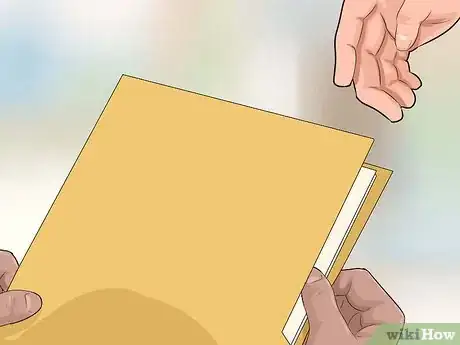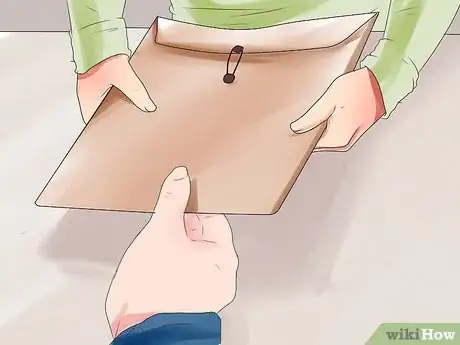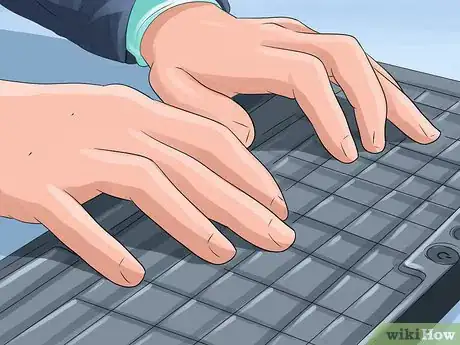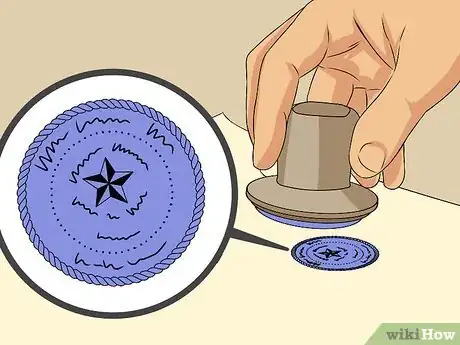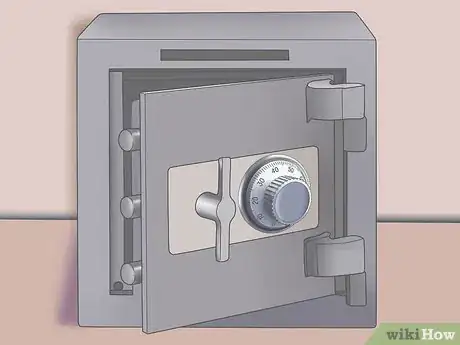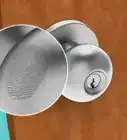This article was co-authored by Clinton M. Sandvick, JD, PhD. Clinton M. Sandvick worked as a civil litigator in California for over 7 years. He received his JD from the University of Wisconsin-Madison in 1998 and his PhD in American History from the University of Oregon in 2013.
There are 8 references cited in this article, which can be found at the bottom of the page.
This article has been viewed 58,731 times.
Notary Publics use a notary stamp when performing their official duties. These duties may include attesting to the identity of individuals signing official documents and the validity of their signatures. In order to officially use a notary stamp as a notary public, you must first become a notary, purchase a stamp that complies with state requirements and use the stamp in the proper way. A notary stamp commonly includes the notary’s name, county of residence, and commission expiration date.
Steps
Becoming a Notary Public
-
1Decide in which state you want to act as a notary. If you meet the qualifications, states grant notary public certifications to residents from their own states. Some states also allow nonresident notaries to work in their state, if the nonresidents reside in an adjoining state and/or they maintain a business office in the state. If you want to work as a notary in a state other than where you reside, you must check the notary requirements for both states.[1] You can find a list of state-by-state requirements here: https://www.asnnotary.org/?form=stateinfo.
-
2Determine if you meet the minimum Notary Public qualifications for your state. Once you have determined that you are eligible to work in a particular state, reexamine your state’s notary requirements and check whether you meet the minimum qualifications to work as a notary. While every state has different minimum qualifications, states may require the following:
- Applicant must be at least 18 years old.
- Applicant must not have been convicted of a felony.
- Applicant must reside in the state or a bordering state.
- Applicant must be able to read and write English.
- Applicant must have a physical business address in the state.
- Applicant must have high school diploma.
Advertisement -
3Complete notary application requirements. Once you have determined that you meet the minimum qualifications to act as a notary in a state, your next step is to complete the application requirements to become a notary. You can check your state’s application requirements by conducting an internet search for your state’s name and “notary application” and reviewing the website. You can also revisit the website discussed above that provides state-by-state notary requirements.
-
4Fill out an application. If required by your state, notary applications may request your name and contact information, your date of birth, questions regarding felony convictions, occupation information, and business address.[2]
-
5Take a notary training course. Some states require that you take a training course, either online or in-person, from an approved vendor. You may not be able to take a notary exam or complete your notary application until you have a certificate stating that you completed an approved training course.[3] The cost for the training is generally between $100-$200.
-
6Take a notary exam. Some states require that you take an exam, in-person or online, to demonstrate your knowledge of the state’s notary law, procedures and guidelines.[4]
-
7Acquire a surety bond. Your state may legally require to purchase and maintain a surety bond for the duration of your notary commission. The bond is meant to protect state residents from improper conduct by a notary that results in a financial loss.
-
8Acquire notary insurance. Some states require that you purchase notary insurance. This insurance protects the notary if they are sued for mistakes. Even if this insurance is not required by your state, you should seriously consider acquiring this insurance to protect yourself from financial loss.[5]
-
9Pay application fees. Most states require that you pay an application fee when you submit your application. Make sure that you submit the proper fee or your application may not be accepted.
-
10File your paperwork with appropriate governmental office. Each state has different requirements on how to file your application. If it is a hardcopy document, you may be asked to send the document to the Secretary of State. Many states also provide online applications, which once submitted are directed to the appropriate state office.
-
11Receive your notary public commission from the state. Once you have completed your notary application and any other state-specific requirements, your application will be processed. If approved, you should receive a certificate of your notary public commission from the state.
Locating Notary Public Supply Stores
-
1Determine if your state requires any documentation for purchasing a notary stamp. When purchasing a notary stamp, you may be required to present evidence of your notary certification, surety bonds or insurance. You can check document requirements for each state here: https://www.asnnotary.org/?form=stateinfo[[Image:Keep-Your-Personal-Life-
Private-At-Work-Step-10-Version-3.jpg|center]]
-
1Determine if your state has any requirements for your notary stamp. A majority of states require that you use an official stamp or seal in your notary duties. Before you purchase your notary supplies, you should determine whether your state has any requirements for notary stamps. You can find a list of state-specific notary stamp requirements here: http://www.notaries.org/notarysealrequirements.html. Some examples of notary stamp requirements are:
- Self-inking stamp with black ink. Self-inking stamps use an internal inkpad to apply the ink during the stamping process.
- Self-inking stamp with ink other than black. Some states require purple or other colored ink so that the notary’s designation stands out on the page.
- Embossed seal. An embosser is a handheld device resembling a large stapler that produces a raised seal on a document by crimping the paper.
- Embossed seal with ink. Some embossers also have an inkpad so that the seal is legible in photocopies of the original document.[6]
-
2Purchase the appropriate notary stamp. Once you have reviewed your state’s notary stamp requirements, you should locate a seller of notary supplies that will customize your stamp to the state’s specifications. You can find notary supplies vendors at the following:
- Online notary supplies vendors. You can conduct an internet search for “notary public supplies. This search will bring up numerous websites for notary public suppliers. You should review multiple websites to see what options are the most cost effective for your state-specific stamp.
- State Notary Associations. State notary associations often provide links to trusted vendors that produce state-specific stamps. You can locate state associations through an internet using your state’s name and “notary association.” Once you locate a state notary association, review the website for links to “supplies.”
- National Notary Associations. In addition to state notary associations, there are several national notary associations that provide links to relevant information, as well as notary supplies. Conduct an internet search for “national notary associations” and your search will return several national organizations. Review their websites for information on how to order state-specific notary supplies.
-
3Safeguard your notary stamp. You are responsible to ensure that your notary stamps are kept in a secure location when not in use so that individuals do not falsely present themselves as notaries. You should keep your stamp and other supplies in a locked box.[7]
# Report lost notary stamps. If your stamp was lost or stolen you should report that loss to the Secretary of State or other agency in charge of notary public in the state where you are commissioned. You may be required to send a certified letter reporting the loss and indicating your notary identification number.[8]
-
1Destroy the seal at the end of the commission. Once your notary commission is expired and your stamp or seal has expired, you are required to destroy or deface the seal so no one else can use it. You can deface the seal in the following ways:
- Use a razor blade or scissors to cut up the ink stamp’s rubber pad.
- Use a hammer or file to destroy an embossing seal by flattening the raised edges of the seal.[9]
Purchasing and Using Other Notary Supplies
-
1Determine whether your state requires a notary record book. In addition to requiring stamps or seals, some states require that notaries record all of their transactions in a record book or journal. You can check if your state legally requires you to maintain a record book here http://www.notaries.org/recordbookrequirements.html.
-
2Purchase a notary record book. Generally, you should be able to purchase a notary record book from the same vendor where you purchased your notary stamp (see above). Some vendors offer a flat-fee package deal that includes all of the supplies that are required for you to act as a notary. You should compare the prices at several vendors to ensure that you get the best price.
-
3Maintain proper information in record book. States that require you to maintain a record book may also specify what information must be recorded for each time that you notarize a document. Secretary of State websites will set forth the information that needs to be recorded. You can locate state-by-state record book information here: http://www.asnnotary.org/?form=rbkrequirements.
References
- ↑ https://www.asnnotary.org/?form=faqs
- ↑ http://www.state.nj.us/treasury/revenue/dcr/pdforms/notapp.pdf
- ↑ http://www.sos.state.co.us/pubs/notary/notaryTraining.html
- ↑ http://www.sos.state.co.us/pubs/notary/notaryTesting.html
- ↑ https://www.notary.org/bonds-insurance/pa-notary-eo-insurance
- ↑ http://www.notaries.org/notarysealrequirements.html
- ↑ http://www.notarypublicstamps.com/articles/how-to-handle-lost-or-stolen-notary-supplies/
- ↑ http://www.notarypublicstamps.com/articles/how-to-handle-lost-or-stolen-notary-supplies/
- ↑ http://www.asnnotary.org/?form=stampsealissuesl
About This Article
To get a notary stamp, first you'll need to become a notary public in your state by filling out an application, passing the exam, and paying any applicable fees. Once you've received your notary public commission, check to see if your state has any requirements for your notary stamp, like an embossed seal. If it does, you'll need to find a seller of notary supplies that offers a stamp that meets those requirements. For help finding a trusted seller, visit the website for your state notary association. To learn how to take care of a notary stamp after you receive it, scroll down!



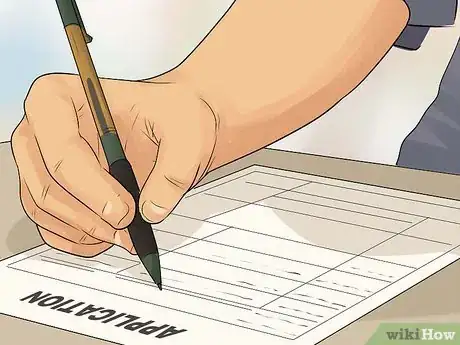
-Step-6-Version-3.webp)




